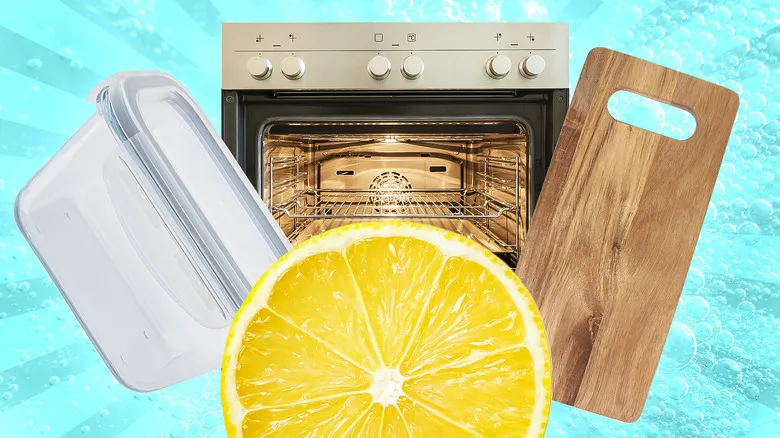Clean your cutting board
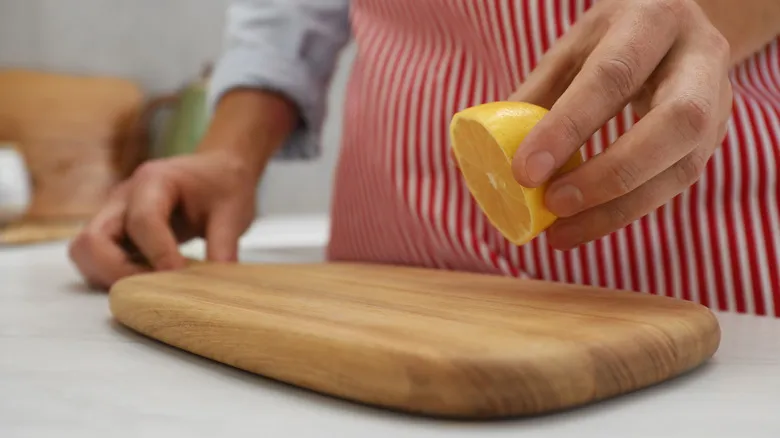
Selecting the ideal cutting board for your kitchen can be a challenging decision. With a variety of materials and colors available—plastic, wood, glass, marble—it's easy to feel overwhelmed. Wood is a favored choice due to its neutral hue, which complements most kitchen designs, and it tends to resist scratches better than plastic. However, maintaining a wooden cutting board in a clean and stain-free condition can be difficult, particularly when working with deeply pigmented foods like strawberries or beets.
For everyday cleaning, hot soapy water is your best bet for keeping your wooden cutting board fresh. If you encounter a tough stain, lemon juice can be your savior. To tackle the stain, simply sprinkle salt over the board and then rub half a lemon on top. Allow the mixture to sit for about five minutes before wiping it down with a damp cloth. The beauty of this method is that you can use a lemon that’s already been juiced, making it a perfect end-of-day task after cooking with lemons.
Not only does lemon juice enhance the appearance of your board, but it also possesses antibacterial properties, ensuring that your board is sanitized in the process. Additionally, the refreshing scent of lemon will help eliminate any lingering odors from garlic or onions, making lemon juice an excellent choice for maintaining your cutting board.
Make your sink sparkle
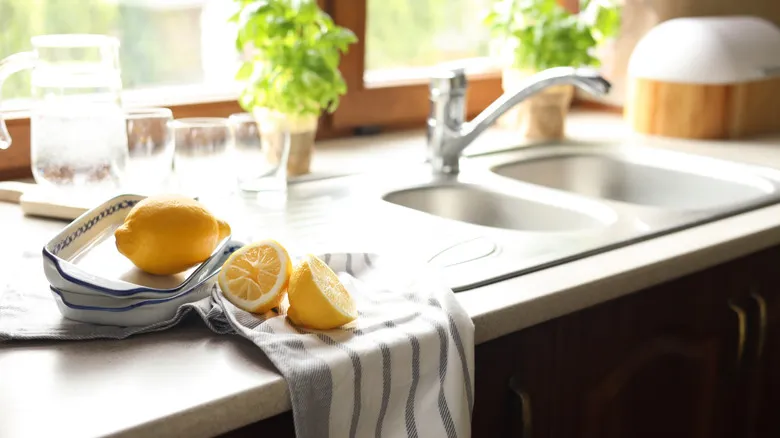
Cleaning the kitchen is a daily task that many of us find unappealing, and while we often focus on the countertops, the sink tends to be overlooked. Stains and grime can accumulate quickly, leaving your sink looking less than pristine. Fortunately, with a simple wedge of lemon, you can effortlessly tackle your sink and have it shining in just a few minutes.
Inspired by a TikTok video, you can clean your sink using a lemon half instead of a sponge. Start by adding a drop of dish soap directly into the sink, then use the lemon as you would your sponge. You'll soon notice the dirt and grease loosening from the surfaces and flowing toward the drain. If you incorporate this into your regular cleaning routine, your sink will easily gleam after a quick wipe with the lemon, giving you more time to focus on other areas of the kitchen or relax with a cup of tea.
You can apply the same technique to your faucets, making it easy to keep all the stainless steel parts of your kitchen clean. However, avoid using lemon juice on porous surfaces like marble and granite, as it can etch and damage them.
Make a natural air freshener
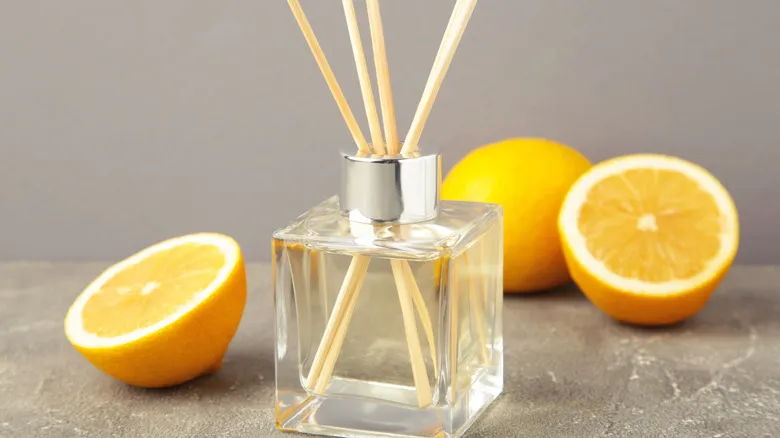
One of the wonderful benefits of using lemons for cleaning your home instead of chemical cleaners is the delightful aroma they produce. They leave your kitchen smelling naturally fresh, unlike some of the stronger commercial sprays that can emit an unpleasant odor.
To make the most of this, you can transform your lemons into a fragrant natural air freshener. This allows you to infuse your kitchen or any other room in your home with the lovely scent of lemon whenever you desire. The easiest method is to simmer a pot of water on the stove, adding some grated lemon peel and a couple of tablespoons of lemon juice. If you have access to it, include a teaspoon of baking soda and a few fresh lemon balm leaves.
Once you've prepared your natural air freshener, transfer it to a spray bottle and use it to refresh the kitchen after cleaning or any other rooms in the house. You can even incorporate a few drops of your favorite essential oils to create a unique scent each time.
Degreases the microwave
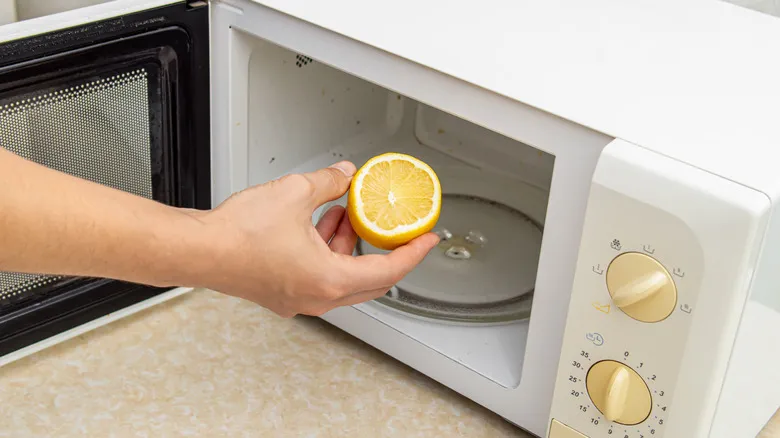
If you've ever microwaved food without a cover, you know how annoying it can be to clean up the splattered grease that coats the interior—especially with homemade tomato soup or other oily dishes. Even if you consistently cover your food, grime and residue will accumulate over time, requiring a thorough scrub to bring your microwave back to its pristine condition.
The good news is that you can simplify this chore with a reliable lemon, which helps break down the grease for easier cleaning. To get started, you'll need a microwave-safe bowl, a lemon, and a sponge. Squeeze the lemon juice into about half a cup of water in the bowl, then toss in the squeezed lemon halves. Microwave the mixture for about three minutes, allowing the lemon-scented steam to do the work for you.
The citric acid in lemons has antibacterial properties that will help thoroughly clean your microwave and keep it fresh. After the cooking time is up, let the bowl sit inside for a bit longer to maximize its effectiveness. When you finally open the door and wipe down the interior with the sponge, you'll be pleasantly surprised at how easily the grime comes off.
Get streak-free glassware
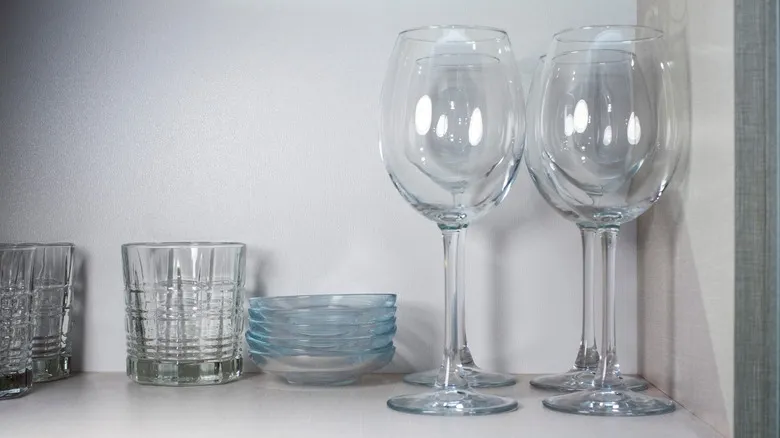
Arranging your freshly cleaned glasses in the cupboard can feel like a well-earned treat after a long session of kitchen cleaning. However, that satisfaction can quickly fade when you notice unsightly streaks marring their surface. Whether you wash them in a dishwasher or by hand, fingerprints and smudges can easily find their way onto your glassware, ruining that pristine appearance.
If you have an upcoming dinner party or event where you want your glassware to shine, a little lemon can be your secret weapon. Simply rub a cut lemon on the glass to let the citric acid dissolve any residue, leaving your glasses gleaming. Alternatively, you can mix some lemon juice with water in a bowl and soak the glasses for five minutes, allowing the solution to work its magic. In either case, you'll end up with beautifully sparkling glassware to dazzle your guests, with just a subtle hint of citrus fragrance lingering.
Freshen the fridge
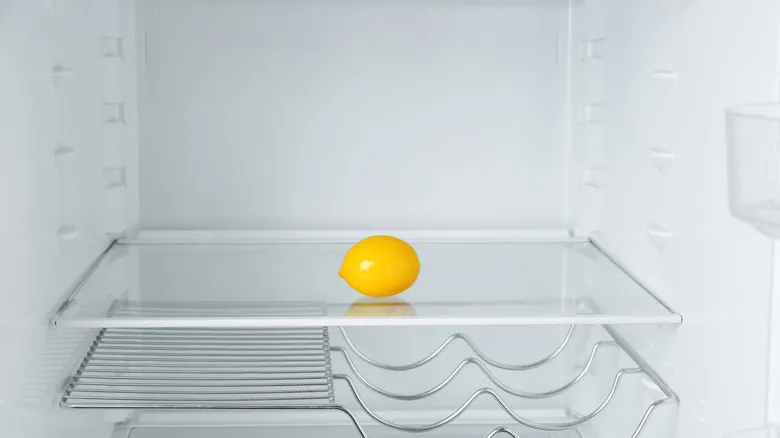
A key aspect of keeping a tidy kitchen is ensuring that the refrigerator is clean and organized. However, in our hectic lives, it’s easy to overlook this essential chore, leading to unaddressed spills and unpleasant odors. If your fridge has lost its freshness, it might be time to take action—armed with a reliable lemon.
For optimal results, start by completely emptying the refrigerator. This allows you to dispose of any expired items or food that has seen better days. Next, squeeze some fresh lemon juice onto a cloth and use it to wipe down every surface inside the fridge. The citric acid will effectively cut through grease, while the refreshing citrus scent will leave a delightful fragrance behind. Once the fridge is spotless, return all your food to the shelves. To maintain that fresh smell, slice a lemon and place the pieces on a plate at the back of the fridge. This simple trick will help keep your refrigerator smelling clean for days, and you can replace the lemon slices as needed to sustain the freshness.
Add to the dishwasher
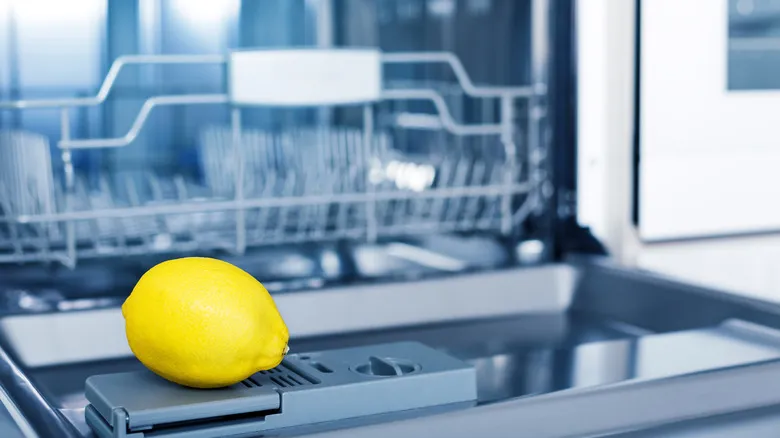
If you've been preparing a recipe that requires a lot of lemons—like a lemon meringue pie or a pitcher of lemonade—don't toss those used lemons in the trash just yet. You can extend their usefulness and reduce your cleaning time by placing them in the dishwasher.
As the dishwasher runs, it can extract additional lemon juice from the spent lemons, which will help break down grease and grime on your dishes. If you're often dissatisfied with how your plates and glasses come out of the washer, giving this tip a try might lead to cleaner crockery that meets your expectations.
The ideal spot for the lemon is in the cutlery rack or secured on the top shelf using a plate wire, ensuring it stays in place and doesn't block the filter. This simple trick not only maximizes the use of your leftover lemons and leaves your dishes gleaming, but doing it regularly will also help keep your dishwasher cleaner and smelling fresh.
Clean up the garbage disposal
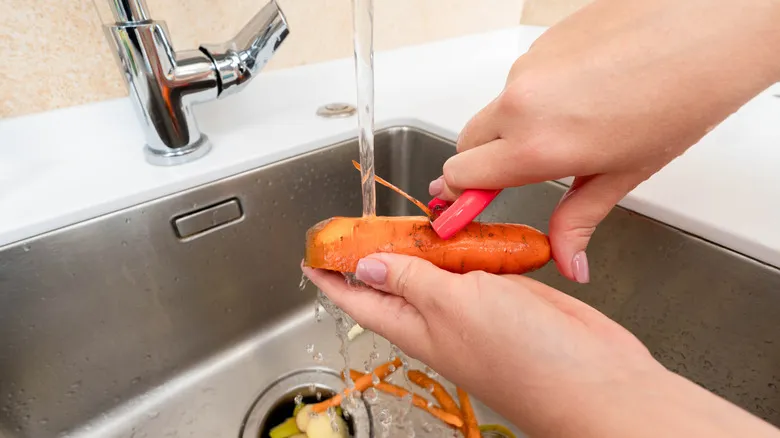
Garbage disposal units are a useful appliance that can help prevent your pipes from becoming clogged with leftover food that ends up in the drain. However, like any other kitchen equipment, they can become clogged with debris and remnants if not properly maintained. If you start to notice an unpleasant odor coming from your sink, it may be time to clean the garbage disposal.
A safe and effective way to care for your garbage disposal without risking injury is to use lemons for cleaning. This method works best if you begin when the disposal is new or has just been cleaned, as it helps prevent sludge buildup. Simply cut a fresh lemon into wedges and feed them into the disposal one at a time, waiting for each piece to be fully processed before adding the next. You may hear the blades struggling as they chop through the tough lemon peel, but rest assured, they are getting a nice polish from the lemon as they work. After cleaning your disposal this way, remember to toss any leftover lemon scraps into the unit whenever you use lemons in your cooking to keep those blades fresh.
Make cleaning the oven a bit easier
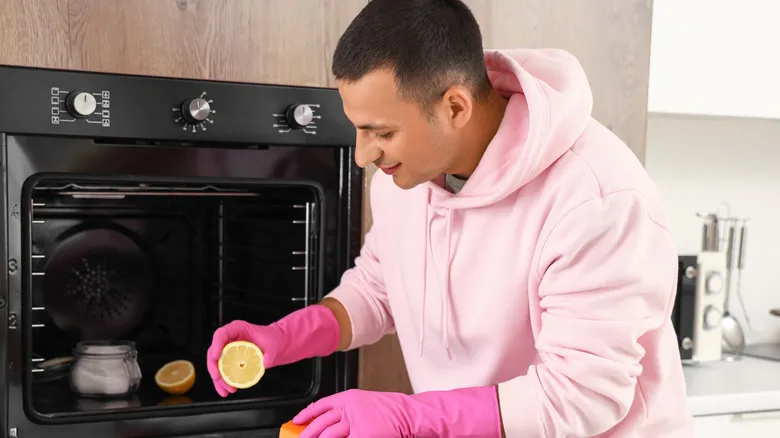
Cleaning the oven — what a daunting chore. It's a task that many homeowners dread, and although we often promise ourselves to clean it more frequently to make it easier, it rarely happens. However, by utilizing lemons to assist with the process, you can keep your oven in good condition and avoid spending an entire day scrubbing every few months.
Similar to some other tips on this list, this method involves generating lemony steam that will circulate in the oven while you take a break. Simply find an oven-safe dish, fill it with water, and add the juice of two lemons. Preheat the oven to about 250 degrees Fahrenheit for 20 minutes, then leave the dish inside for an additional 20 minutes after turning it off.
Afterward, you can use the warm lemon water to wipe down the oven's interior with a cloth, making the task much easier since the acidity of the lemons will have begun to break down the grime. If you incorporate this into your routine, it will become progressively easier, transforming oven cleaning from one of the most disliked chores in the house into a straightforward maintenance task that requires minimal effort.
Make a homemade glass cleaner

Is there anything more frustrating than spending ages cleaning windows and glass doors, only to step back and see unsightly streaks? With the help of lemons and another acidic pantry staple, you can eliminate those streaks and keep your sanity intact!
Mix one part white vinegar with two parts lemon juice and dilute it with warm water, then pour the mixture into a spray bottle. This all-natural glass cleaner is antibacterial and will leave your windows and doors sparkling. You can even use it on glass shelves in your fridge or freezer, so you won’t have to rely on harsh chemicals for surfaces that come into contact with your food.
To make this homemade solution even more cost-effective, whip up a batch whenever you have leftover lemons from cooking. Instead of letting the unused half sit in the back of the fridge, squeeze it into your spray bottle and put it to good use the next day. Then, step back and admire your streak-free windows with pride!
Restore your plastic containers
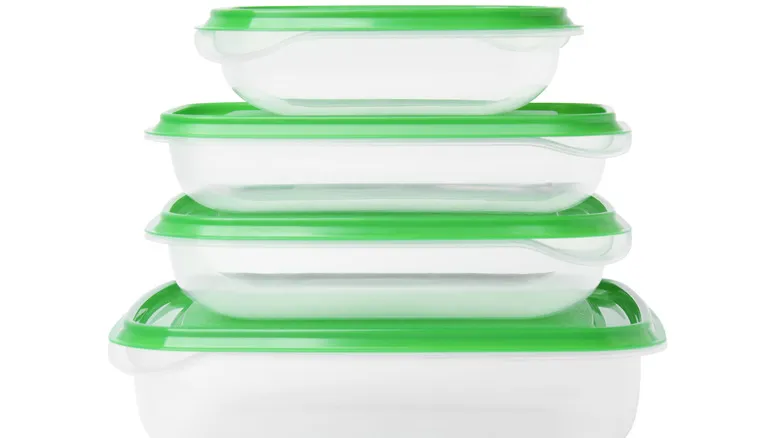
If you enjoy meal prepping or prefer to organize leftovers neatly in your fridge or freezer, you likely have a collection of plastic containers. While they are quite useful, over time they can develop unsightly stains and unpleasant odors that regular washing can't eliminate—especially from tomato sauce. Fortunately, with a little help from lemon, you can rejuvenate your plastic containers.
To refresh your container, begin by cutting a lemon in half and squeezing some juice into the plastic tub. Next, take the lemon half and rub it over the container, focusing on the stained areas. After you've covered the entire surface, let the lemon juice sit in the container to dry. Finally, give it a quick wipe, and the stains should be gone. Plus, it will smell much fresher, thanks to the delightful citrus aroma.
Recommended
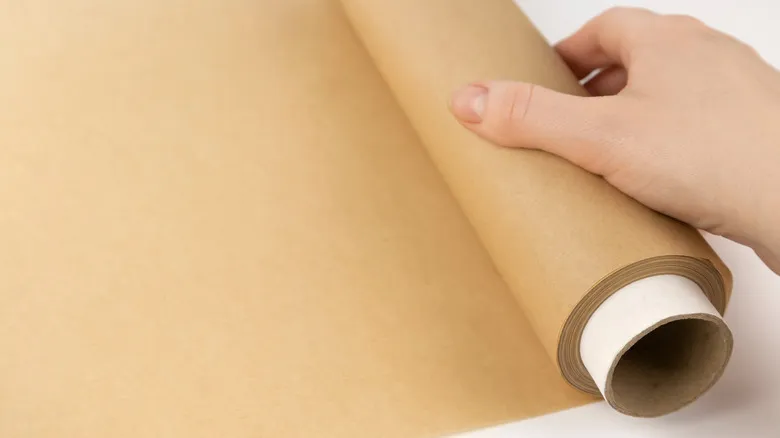
Parchment Paper Is Key For Perfectly Organized Kitchen Drawers
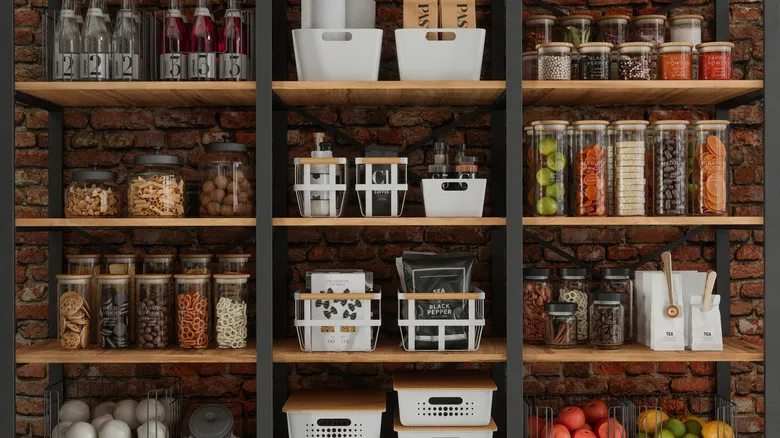
12 Foods That Don't Last In Storage Like You Think
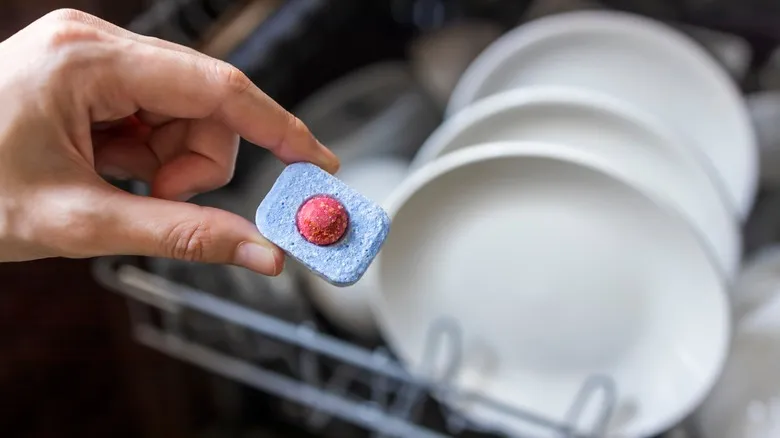
Grab A Dishwasher Tablet If You Want The Cleanest Stove Door Ever
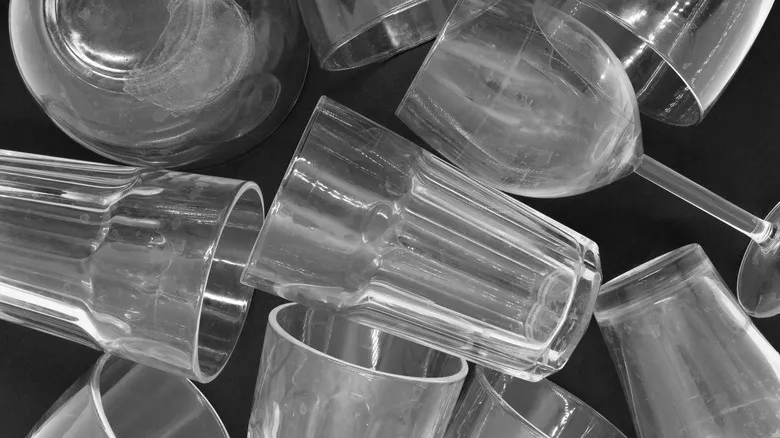
The Reason Your Glassware Is Cloudy (And How To Fix It)
Next up

